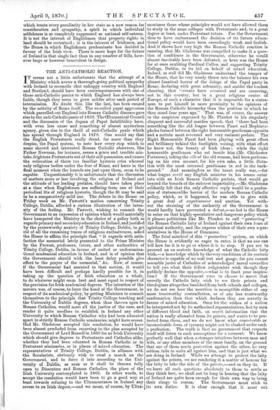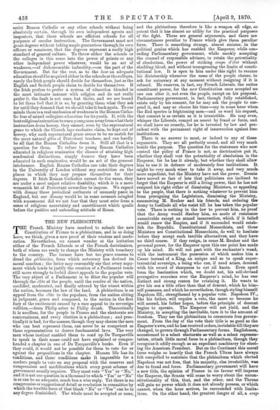THE ANTI-CATHOLIC REACTION.
TT seems not a little unfortunate that the attempt of a Ministry which avows a thorough-going political sympathy with Ireland to reconcile that unhappy country with England and Scotland, should have been contemporaneous with one of those anti-Catholic panics to which England has always been liable, though they seem to grow milder after each period of intermission. No doubt this, like the last, has been caused by the activity of Rome itself. The so-called papal aggression which parcelled out England into Roman Catholic dioceses gave rise to the anti-Catholic panic of 1850. The CEcumenieal Council and the discussion of the dogma of Papal Infallibility have, with even less cause and something of almost mysterious agency, given rise to the thrill of anti-Catholic panic which has spread through England in 1870. One would say that the English Protestants really dread, far more than they despise, the Papal system, to note how every step which to some shrewd and interested Roman Catholic observers, like Father Newman, for instance, seems a grave and terrible mis- take, frightens Protestants out of their self-possession, and causes the reiteration of those too familiar hysteric cries whereof only religious bodies under the fear of Rome, and hares in the final moment when the hounds are just upon them, seem to be capable. Unquestionably it is unfortunate that the discussion of matters more or less involving the religion of Ireland and the attitude of her leading prelates, should have taken place at a time when Englishmen are suffering from one of their periodical fits of religious hysteria, though the fit may be said to be a comparatively mild one. The debate in the House on Friday week on Mr. Fawcett's motion concerning Trinity College, Dublin, afforded a curious illustration of the inten- sity of the feeling. Mr. Fawcett, wishing to commit the Government to an expression of opinion which would materially have hampered the Ministry in the choice of a policy both as regards primary and secondary education in Ireland, and justified by the praiseworthy anxiety of Trinity College, Dublin, to get rid of all the remaining traces of religious exclusiveness, asked the House to affirm the principle that "it regards with satis- faction the memorial lately presented to the Prime Minister by the Provost, professors, tutors, and other authorities of Trinity College, Dublin, in favour of united or undenomina- tional academical education in Ireland, and is of opinion that the Government should with the least delay possible give effect to the prayer of the memorial," &c. Now, of course, if the Government had assented to that motion, it would have been difficult and perhaps hardly possible for it, in taking up the question of Irish education as a whole, to do whatever might seem best and most equal in respect of the provision for Irish academical degrees. The intention of the movers was, of course, to force the hand of the Government, in respect of its academical policy, by getting Ministers to commit themselves to the principle that Trinity College teaching and the University of Dublin degrees, when thus thrown open to Roman Catholics, would meet all the justice of the case, and render it quite needless to establish in Ireland any other University to which Roman Catholics who had been educated apart in strictly Roman Catholic seminaries, might have access. Had Mr. Gladstone accepted this resolution, he would have been almost precluded from recurring to the plan accepted by the Government of Lord Russell in 1866 for an Irish University which should give degrees to Protestants and Catholics alike, whether they had been educated in Roman Catholic or in Protestant seminaries, or in places of mixed education. The representatives of Trinity College, Dublin, in alliance with the Secularists, obviously wish to steal a march on the Government, and to force it into according to the Uni- versity of Dublin, as soon as it shall be thrown fully open to Dissenters and Roman Catholics, the place of the Irish University contemplated in 1866. In other words, to accept the resolution would have been to go a good way at least towards refusing to the Ultramontanes in Ireland any access to an Irish degree,—and we mean, of course, by Ultra- montanes those whose principles would not have allowed them to study in the same colleges with Protestants and, to a great degree at least, under Protestant tutors. For the Government thus to have embarrassed the decision of its future educa- tional policy would have been exceedingly weak and foolish. And it shows how very high the Roman Catholic reaction is running, that Mr. Gladstone was compelled to make it a ques- tion of confidence in the Government, otherwise he would almost inevitably have been defeated, so keen was the House for at once snubbing Cardinal Cullen, and supporting Trinity College, Dublin, in its bid on behalf of mixed education. Indeed, so well did Mr. Gladstone understand the temper of the House, that he very wisely threw into the balance his own almost fanatical horror of the doings of the Papal party in Rome, declaring with great solemnity, and amidst the loudest cheering, that "events have occurred and are occurring, not in this country, but in a great religious centre of Europe, of such a character that it is impossible for a states- man to put himself in more proximity to the opinions of the Roman Catholic hierarchy than the position in which he then stood four years ago." That was, of course, the answer to the suspicion expressed by Mr. Plunket in his singularly eloquent and successful maiden speech, that "there had been something like the old league between Faust and Mephisto- pheles formed between the right honourable gentleman opposite and a certain most reverend and very eminent prelate. The Right Honourable Faust had been playing with great effect and brilliancy behind the footlights, wooing, with what effect he knew not, the beauty of Irish ideas ; while the right honourable gentleman who sat beside him (Mr. Chichester Fortescue), taking the ride of the old woman, had been perform- ing on his own account, for his own sake, a little flirta- tion with the most reverend gentleman in red in the back- ground." And meaningless as the taunt really was,—for what league could any English minister in his senses enter into with an Irish Roman Catholic prelate, that would go beyond the bounds of the strictest impartiality,—Mr. Gladstone evidently felt that the only effective reply would be a profes- sion of statesmanlike horror of the modern Roman Catholic policy, which, as it happened, he was able to give with a great deal of empressement and unction. Yet with- out the straining of the authority of the Government it would hardly have prevented a defeat,—so hot is the House to enter on that highly speculative and dangerous policy which it pleases politicians like Mr. Plunket to call " protecting " the Roman Catholic laity of Ireland against their own fears of spiritual authority, and the express wishes of their own repre- sentatives in the House of Commons.
The fatal mischief of this " protective " system, on which the House is evidently so eager to enter, is that no one can tell how far it is to go or where it is to stop. If you are to proceed on an esoteric knowledge of what the Catholic laity wish,—a knowledge which by the very conditions of its esoteric character is capable of no real test and gauge, for you cannot assemble juries of Catholics of acknowledged moral cowardice to tell you what their fellow religionists wish though they publicly declare the opposite,—what is to limit your inspira- tion? If the Government were to choose to assert that secretly the Catholic laity wish to see their priests and theologians altogether banished from both schools and colleges, we do not see how the assertion is susceptible either of any more trustworthy contradiction, or of any less trustworthy confirmation than that which declares they are secretly in favour of mixed education. Once let the wishes of a nation be interpreted not by its authorized representatives, but by men of different blood and faith, on secret information that the nation is really alienated from its priests, and wants to be pro- tected from them, and we do not know what conceivable or inconceivable form of tyranny might not be cloaked under such a profession. The truth is that no government that respects itself will listen to such assumptions for a moment. We know perfectly well that when a stranger interferes between man and wife, or any other members of the same family, on the ground that one of them needs protection against the other, he very seldom fails to unite all against him, and that is just what we are doing in Ireland. While we attempt to protect the laity against the priests, we are rendering it a matter of honour for the laity to take the side of the priests,—and so they do. If we leave all such questions absolutely to them to settle as they think best, we shall not be long in hearing that the laity of Ireland are quite keen enough for their own way to bring their clergy to reason. The Government must stick to its own duties. It is clear enough that it must not assist Roman Catholic or any other schools without being absolutely certain, through its own independent agents and inspectors, that these schools are efficient schools for all purposes of secular instruction. The Government must not grant degrees without taking ample guarantees through its own officers or nominees, that the degrees represent a really high standard of general culture. To throw either the schools or the colleges in this sense into the power of priests or any other independent power whatever, would be an act of weakness,—of dishonourable imbecility,—on the part of the Government. But for the rest, as to the how an adequate education should be acquired either in the schools or the colleges, surely the Irish people should decide for themselves, just as the English and Scotch people claim to decide for themselves. If the Irish profess to prefer a system of education blended in the most intimate manner with religion and do not really prefer it, the fault is not ours, but theirs, and we are bound to let them feel that it is so, by granting them what they ask for until they demand that we should take it back again. To our minds there is a real confession of weakness in the Roman Catho- lic fear of mixed collegiate education for its youth. If, with the best religious instruction to warn young men away from what their instructors deem heresy, they cannot, even by the supernatural grace to which the Church lays exclusive claim, be kept out of heresy, why such supernatural grace seems to be no match for the mere natural gifts of Protestant teachers, and can hardly be all that the Roman Catholics deem it. Still all that is a question for them. To refuse to young Roman Catholics educated in religious seminaries the chance of attaining high academical distinctions, simply because they have been educated in such seminaries, would be an act of the grossest intolerance. English Roman Catholics can take their degrees in the University of London without any restriction on the places in which they may prepare themselves for their degrees. If Irish Roman Catholics cannot do the same, they are under a most unjust relative disability, which it is a mere -womanish bit of Protestant cowardice to impose. We regard with dismay these periodical outbursts of unmanly panic in England, but our dismay would be in some measure mingled with amusement did we not fear that they must arise from a sense of religious uncertainty and unsettlement which quails before thc positive and unbending attitude of Rome.



































 Previous page
Previous page